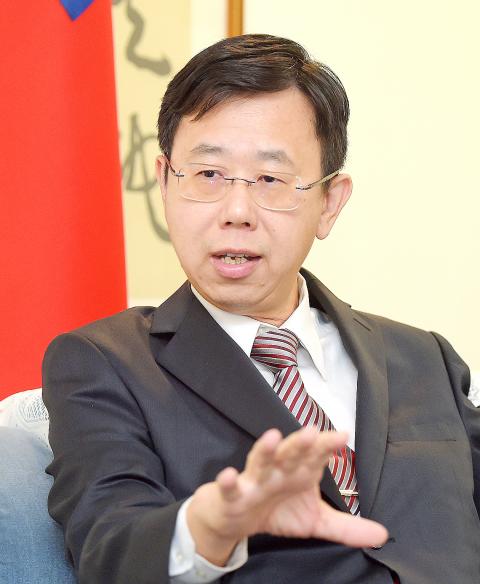Liberty Times (LT): How will the Investigation Bureau help prosecutors investigate bribery in relation to the nine-in-one local elections?
Leu Wen-jong (呂文忠): We have already done much to advocate against bribery and in terms of intelligence, we have analyzed the electoral districts where bribery is more likely to occur, and assessed which electoral districts and candidates are more likely to bribe voters, listing them as targets for investigation.
In addition, we have deployed 183 investigators to district prosecutors’ offices around the nation, where they are to remain stationed for a month. We will be adjusting these arrangements depending on the atmosphere and the needs of different offices.

Photo: Huang Yao-cheng, Taipei Times
LT: How can the bureau prevent foreign forces from interfering with the local elections?
Leu: If foreign forces were to meddle in the elections, it would affect the fairness of the vote. Intelligence reports show that China is attempting to influence the elections using various methods.
The bureau’s divisions will strengthen their collection of intelligence on such attempts. If the bureau discovers [individuals or groups] who might be involved in such attempts, it will ask the responsible district prosecutors’ office to direct the investigation.
The bureau has obtained some intelligence indicating that Chinese are attempting to interfere with the elections using financial means, primarily by supporting individual candidates
LT: “Fake news” and disinformation can threaten national security. How does the bureau collect reports on such operations and investigate them?
Leu: The Internet has become essential and it is not just Taiwan that is facing the problem of fake news and disinformation — the problem affects countries worldwide. Some of the disinformation affects national security, some of it affects social order, some of it affects people’s reputations.
For the moment, the bureau is focused mainly on disinformation that threatens national security or social order. If we encounter what appears to be fabricated information, once investigators determine it to be fake news and find that its dissemination is criminal in nature, we will move to prosecute the offenders.
If it does not touch upon criminal behavior, but threatens the government’s authority and responsibility, it is still necessary to deal with it. [In such cases] we will hand the case over to relevant authorities so that they can act.
We have personnel systematically collecting and analyzing reports on disinformation posted to Facebook and other social media platforms, as well as [messaging apps] such as Line.
I realize that some people might be concerned that such actions infringe upon the freedom of the press or their freedom of speech. I guarantee that the Investigation Bureau will work strictly within the boundaries of the law.
LT: How does the bureau prevent foreign powers from infiltrating secure institutions and accessing classified information? How does it protect national security?
Leu: Protecting national security is the bureau’s most important mission. Due to the state of cross-strait relations, China employs every measure possible to recruit Taiwanese officials [for espionage] and access national secrets.
Cases pertaining to national security mostly involve communist spies, Taiwanese recruited to collect classified information or Chinese sent to Taiwan to form spy networks.
One good example is the case of Chinese People’s Liberation Army intelligence officer Zhen Xiaojiang (鎮小江) who came to Taiwan to set up such a network. Another is the unsuccessful attempt by [former Chinese student] Zhou Hongxu (周泓旭) to form a cell in Taiwan.
Then there was the case of retired Taiwanese military officer Pien Peng (邊鵬), who was found to be helping the Chinese gather military secrets.
Over the past five years we have handled 52 national security cases involving 115 people.
LT: What are your expectations for bureau staff?
Leu: The bureau has a long and lustrous tradition. It has shown outstanding performance no matter whether it is protecting national security or investigating crime. Of course, the bureau is also facing some new challenges and responsibilities.
Right now, the bureau’s most important job is to investigate election bribery and ensure the fairness of the elections. Second, it is to maintain national security and protect social order. Third, it must preserve procedural justice and ensure law-based governance. Fourth, it must strengthen its partnerships and inspire teamwork; and fifth, it must use technology to improve its innovative services.
I want to create a better work environment for bureau staff, free up more energy for investigations and help the bureau fulfill its role as an institution that belongs to the nation and to the people, is innovative and technologically advanced, and values human rights.
Translated by staff writers Sherry Hsiao and William Hetherington

Former president Ma Ying-jeou’s (馬英九) mention of Taiwan’s official name during a meeting with Chinese President Xi Jinping (習近平) on Wednesday was likely a deliberate political play, academics said. “As I see it, it was intentional,” National Chengchi University Graduate Institute of East Asian Studies professor Wang Hsin-hsien (王信賢) said of Ma’s initial use of the “Republic of China” (ROC) to refer to the wider concept of “the Chinese nation.” Ma quickly corrected himself, and his office later described his use of the two similar-sounding yet politically distinct terms as “purely a gaffe.” Given Ma was reading from a script, the supposed slipup

Former Czech Republic-based Taiwanese researcher Cheng Yu-chin (鄭宇欽) has been sentenced to seven years in prison on espionage-related charges, China’s Ministry of State Security announced yesterday. China said Cheng was a spy for Taiwan who “masqueraded as a professor” and that he was previously an assistant to former Cabinet secretary-general Cho Jung-tai (卓榮泰). President-elect William Lai (賴清德) on Wednesday last week announced Cho would be his premier when Lai is inaugurated next month. Today is China’s “National Security Education Day.” The Chinese ministry yesterday released a video online showing arrests over the past 10 years of people alleged to be

THE HAWAII FACTOR: While a 1965 opinion said an attack on Hawaii would not trigger Article 5, the text of the treaty suggests the state is covered, the report says NATO could be drawn into a conflict in the Taiwan Strait if Chinese forces attacked the US mainland or Hawaii, a NATO Defense College report published on Monday says. The report, written by James Lee, an assistant research fellow at Academia Sinica’s Institute of European and American Studies, states that under certain conditions a Taiwan contingency could trigger Article 5 of NATO, under which an attack against any member of the alliance is considered an attack against all members, necessitating a response. Article 6 of the North Atlantic Treaty specifies that an armed attack in the territory of any member in Europe,

The bodies of two individuals were recovered and three additional bodies were discovered on the Shakadang Trail (砂卡礑) in Taroko National Park, eight days after the devastating earthquake in Hualien County, search-and-rescue personnel said. The rescuers reported that they retrieved the bodies of a man and a girl, suspected to be the father and daughter from the Yu (游) family, 500m from the entrance of the trail on Wednesday. The rescue team added that despite the discovery of the two bodies on Friday last week, they had been unable to retrieve them until Wednesday due to the heavy equipment needed to lift